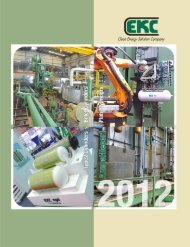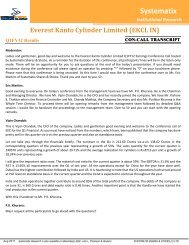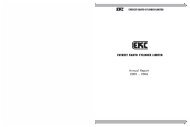Download PDF - Everest Kanto Cylinder Ltd.
Download PDF - Everest Kanto Cylinder Ltd.
Download PDF - Everest Kanto Cylinder Ltd.
You also want an ePaper? Increase the reach of your titles
YUMPU automatically turns print PDFs into web optimized ePapers that Google loves.
7. Economies of scale<br />
EKC enjoys economies of scale as the existing<br />
manufacturing facilities are fully geared up to utilize their<br />
capacities thereby leading to greater operational efficiency<br />
which would result in lower cost of production and increased<br />
profitability.<br />
8. Quick delivery to customers<br />
EKC has the ability to manufacture and deliver vessels of<br />
different sizes from its multiple operating units. This results<br />
in quick delivery to the customers.<br />
9. Investment in New Technologies<br />
EKC has made significant investments in newer and<br />
alternate technologies which would ultimately enable it to<br />
reach leadership status globally. Also, it would be the only<br />
company in India to use alternate technologies and raw<br />
materials in its new plants. This would enable EKC to<br />
broadbase its raw material supply chain which would also<br />
lead to lower cost of production and better working capital<br />
management. The new Greenfield project for CNG cylinders<br />
would enable it to cater to the niche OEM segment outside<br />
India through supply of light weight and more value added<br />
cylinders.<br />
10. Investment in Human Talent<br />
All employees are important to the Company and it believes<br />
that its middle management is particularly critical to its<br />
business, as they are responsible for managing teams,<br />
understanding customer expectations, ensuring consistent<br />
and quality service delivery. These middle managers are<br />
essentially the glue that keeps the entire organization<br />
together. The Company intends to continue to invest in<br />
developing and grooming its middle management talent.<br />
CHALLENGES (C)<br />
1. Raw material intensive industry<br />
Seamless steel tubes are the principle raw material used by<br />
EKC. The quality of cylinders produced is directly dependent<br />
on the quality of raw material used. There are only a few<br />
seamless tube manufacturers globally who meet the<br />
stringent quality specifications. Adequate level of raw<br />
material inventory has to be maintained at all times to ensure<br />
quick turnaround time for orders received. Any volatility in<br />
the prices or disruption in availability of raw material can<br />
impact the profitability of the Company.<br />
However, EKC has strong relationships with the raw material<br />
suppliers. Going a step further to reduce supplier risk, EKC<br />
has setup facilities using alternate manufacturing process<br />
and cheaper raw materials such as billets and plates.<br />
EVEREST KANTO CYLINDER LIMITED<br />
2. Integration<br />
EKC faced the challenge of integrating the operations of CP<br />
Industries Holdings, Inc. (CPI) [acquired by EKC in April,<br />
2008] with its own.<br />
EKC has successfully overcome this challenge and the<br />
complementary product portfolio (CPI’s established position<br />
in the Jumbo cylinders vs. EKC’s strong position in relatively<br />
smaller cylinders) gave an impetus to overall global growth.<br />
3. Competition<br />
Although EKC is the market leader in India with around<br />
60% share, many players have put up high pressure cylinder<br />
manufacturing capacities in India and China. Thus, despite<br />
the robust growth in domestic and global demand, there<br />
might be an overcapacity scenario in the short term.<br />
Besides, the increasing competition in the CNG cylinder<br />
manufacturing business has resulted in an overall margin<br />
contraction at the industry level.<br />
Inspite of the challenge posed by the increase in competition,<br />
EKC would continue to dominate the market place. This<br />
would be on account of EKC’s scale of operations and setting<br />
up of new facilities using alternate technologies and raw<br />
materials.<br />
OPPORTUNITIES (O)<br />
1. Growth in sales of CNG cylinder sales in India and globally<br />
Rising demand in India<br />
Under the Petroleum Ministry’s ‘Vision-2015 document for<br />
consumer satisfaction and Beyond’, the CNG network will<br />
be expanded to 200 cities from the present coverage in 35<br />
cities in India. Apart from the regulatory push which will lead<br />
to the increased usage of CNG, it is ultimately the cost benefit<br />
to consumers, which will propel the growth. Usage of CNG<br />
is beneficial to consumers due to its inherent cost advantage<br />
vis-a-vis other auto fuels. Energy content per kilogram of<br />
CNG is comparable to that of petroleum based fuels. Usage<br />
of CNG in vehicles results in higher mileage per unit due to<br />
its superior combustion characteristics.<br />
Cost benefit analysis of CNG vis-a-vis other fuels<br />
Fuel cost (March, 2011)<br />
CNG : Rs. 31.47 per kg.<br />
Petrol : Rs. 63.08 per ltr.<br />
Diesel : Rs. 42.06 per ltr.<br />
On account of its low price, CNG offers attractive payback<br />
period for conversion of vehicles running on petrol<br />
Fuel Consumption<br />
3 Wheeler 4 Wheeler<br />
CNG / Kg.: 25 Kms 20 Kms<br />
Petrol / Ltr.: 18 Kms 14 Kms<br />
Average running per day (kms) 70 100<br />
Conversion Cost 20,000 30,000<br />
Payback Period (in days) 128 103<br />
Management Discussion & Analysis Annual Report 2010-11<br />
8







